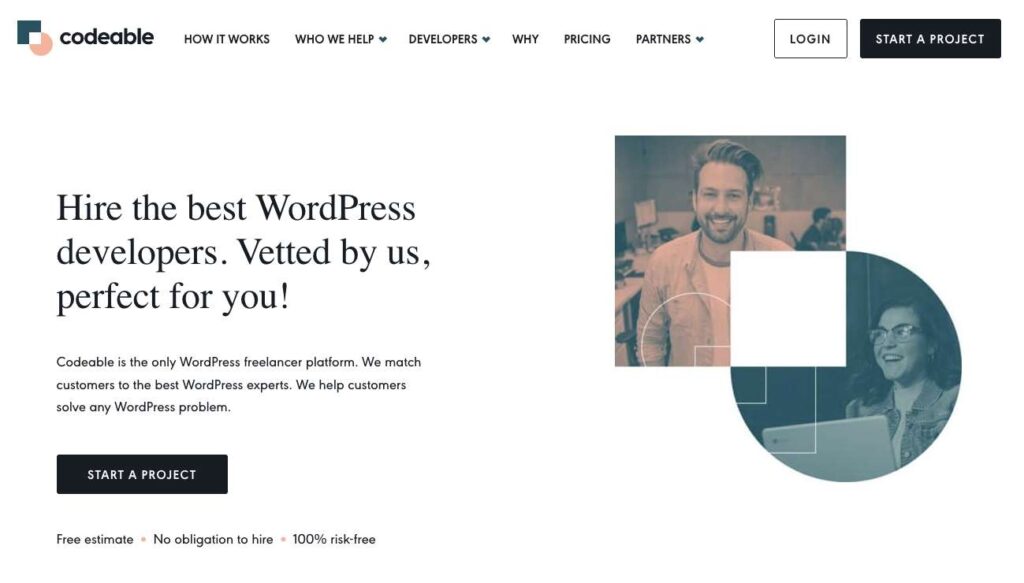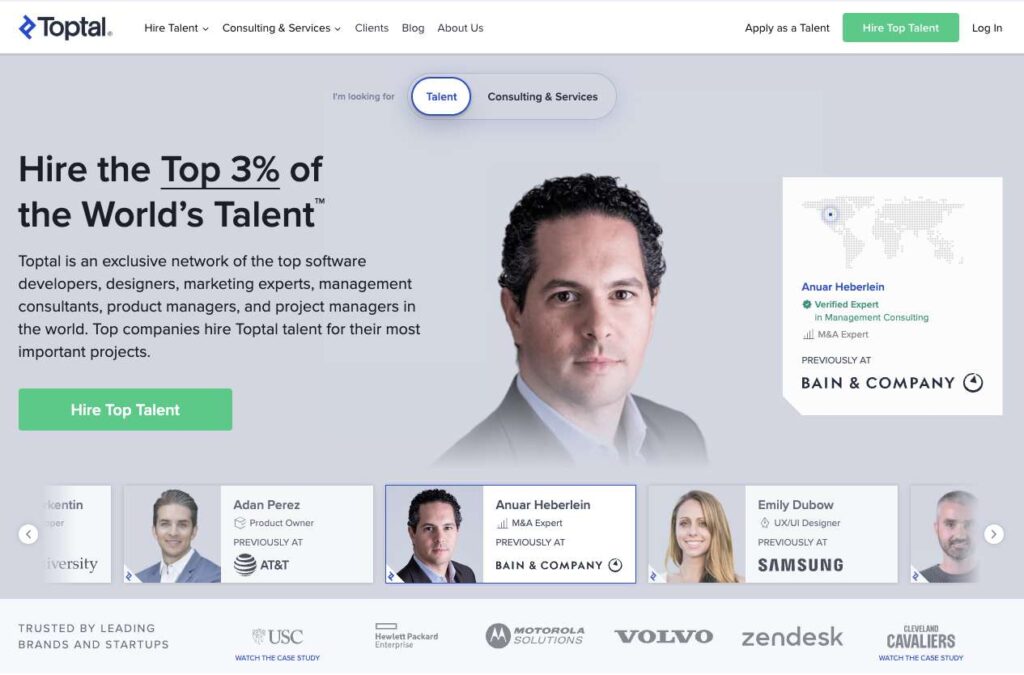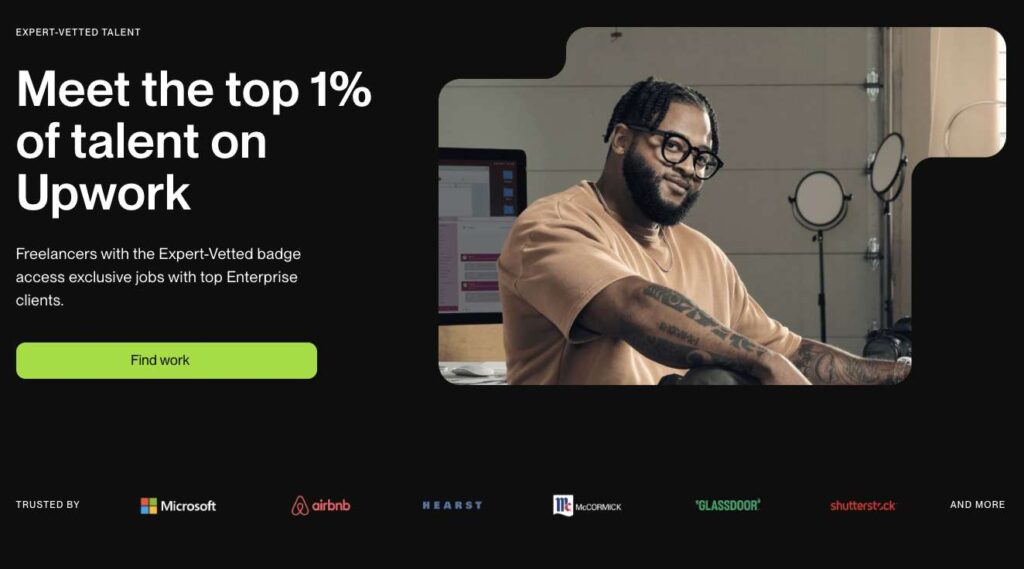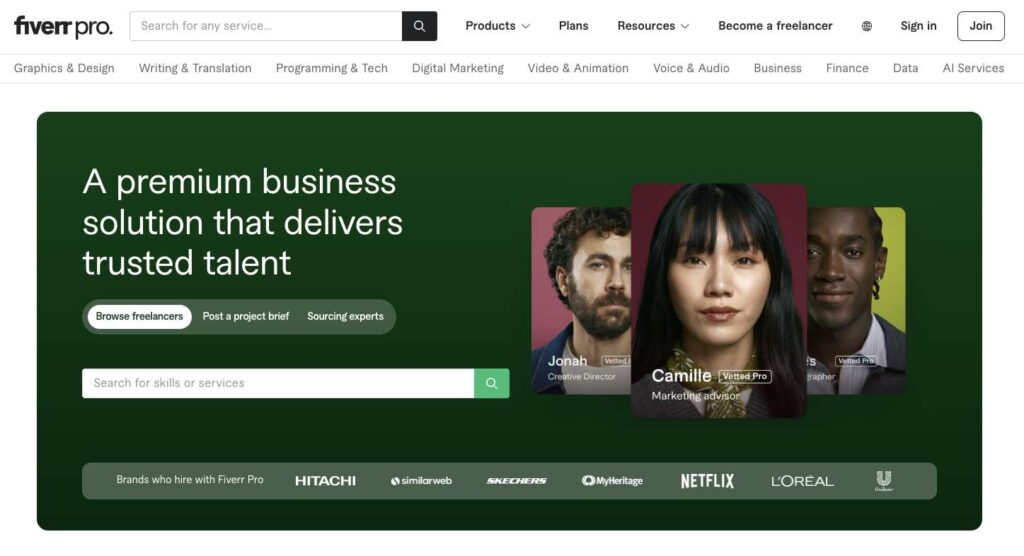Hiring a WordPress developer often feels like a gamble. You have a critical project that needs fixing, so you dive into the freelance market, but the chaos is overwhelming. Many businesses respond by chasing the lowest hourly rate – a costly mistake that leads to bad code and project failures.
It’s an understandable reaction, but it’s a trap. Choosing the cheapest developer is a false economy. Initial savings disappear when you end up paying more to fix buggy code, patch security holes, or finish an abandoned project.
The smarter approach is to prioritize guarantees over price. In this article, we’ll share a strategic framework built on three non-negotiable pillars for hiring success and use it to rank the best platforms for finding WordPress talent.

Get matched with the developer
that is perfect fit for your WordPress or WooCommerce needs.
Start a project
The three guarantees that actually matter when hiring WordPress help
When you’re comparing platforms, it’s easy to get lost in a sea of features and wildly different hourly rates. A successful hire hinges on three core guarantees that form an interconnected system of trust.
The vetting guarantee
Vetting is the comprehensive process a platform uses to verify a developer’s skills, experience, and professionalism before they are ever presented to you.
It’s the platform’s most critical service because it saves you from the near-impossible task of judging a developer’s technical ability. For a non-technical business owner, you’re evaluating signals of quality, not the quality of the code itself.
A truly rigorous vetting process includes multiple stages:
- A professional review. Recruiters analyze a candidate’s resume, public profiles like GitHub, and professional references to get a complete picture.
- A technical exam. Candidates must pass practical skills assessments, like live coding challenges or a paid trial project, to prove their real-world problem-solving abilities.
- A personal interview. A screening for crucial soft skills like communication, motivation, and professionalism ensures they are reliable and easy to work with.
The pricing guarantee
The pricing guarantee is about establishing a fair, transparent financial structure that aligns the price with the value being delivered. This guarantee is built on a foundation of project clarity. When the scope of work is poorly defined, it almost always leads to conflict over “scope creep” on fixed-price jobs or billing overages on hourly ones.
A good developer listing platform overcomes these issues by providing the tools and guidance to help you create a detailed project brief. This process of defining your scope transforms pricing from a source of conflict into a tool for mutual understanding, ensuring you get a fair quotation for the work you need done.
The protection guarantee
This guarantee covers all the mechanisms a platform has in place to protect your investment in the event that things don’t go as planned. The most basic layer is an escrow system, where the platform holds your payment securely and only releases it to the developer once you approve the work.
However, there’s a critical distinction many people miss: the difference between payment protection and quality assurance.
- Platforms with weak or optional vetting can only offer payment protection. Their dispute systems are designed to make sure a freelancer doesn’t run off with your money for no work, but they aren’t equipped to be the judge of code quality.
- Platforms with strong, universal vetting can offer a true quality guarantee. Because they are confident in their talent, they can back the work with things like a 28-day bug-fix warranty or a money-back promise if the project isn’t delivered as agreed. They are focused on securing the outcome rather than the transaction.
WordPress developer platforms ranked by vetting and quality
Now that you understand the three guarantees, let’s see how the most popular platforms for finding WordPress talent actually measure up. The freelance market isn’t a level playing field; platforms fall into distinct tiers based on their commitment to quality control.
The most important difference between these tiers is the intensity of their developer vetting process. This single factor directly impacts the level of quality, price transparency, and protection you can expect for your project. Here’s how they break down.
Tier 1: The elite specialists (vetting is the business model)
At the highest level are the platforms where intense, universal vetting is their entire business model. Their goal is to completely eliminate hiring risk by doing the hard work of technical and professional screening before a client ever sees a candidate. For projects where quality and security are non-negotiable, this is where you start.
Codeable

Codeable has positioned itself as the premier, exclusive platform specifically for hiring WordPress talent. Its entire operation is built on an extreme vetting process designed to ensure a consistent, high standard of quality and reliability.
Codeable’s screening is arguably the most rigorous in the WordPress space, with a multi-stage gauntlet that only 2% of applicants manage to pass. The process includes a professional review of experience, a technical exam and coding project, a live interview to assess personality and customer service skills, and a mandatory internal exam on platform best practices. Even after acceptance, new experts work under a 90-day trial period and are continuously monitored to ensure they maintain high standards.
The platform uses a transparent, value-focused pricing model that avoids the “race to the bottom” seen elsewhere. You submit your project for free, and vetted experts provide a fixed-price estimate. Hourly rates generally fall within a guided range of $80 – $120.
Because Codeable is so confident in its vetting, it offers the best protection in the industry. All completed work is backed by a 28-day bug-fix warranty and a full money-back guarantee if an expert fails to deliver on the agreed-upon scope. If an expert has an emergency, the support team can even reassign the project to another qualified developer to ensure it gets finished.
Toptal

Toptal is a premium talent marketplace for a wide range of technical fields, not just WordPress. Its brand is built on a simple, powerful promise: providing clients with access to the top 3% of global freelance talent, enforced by an exceptionally demanding screening process.
Toptal’s 5-step vetting process is famous for its difficulty. It’s an aggressive filter designed to weed out everyone but the most elite candidates. It starts with language and personality tests, moves to in-depth skill reviews, then a live screening with a senior engineer, and finally a real-world test project that takes 1-3 weeks to complete.
However, the pricing model is Toptal’s most controversial aspect due to its lack of transparency. The platform has a hidden markup system; clients are quoted an all-inclusive hourly rate (often $100-$250+) but are never informed of the developer’s compensation versus the commission retained by Toptal. This markup can be as high as 100%, meaning a developer might only receive half of what the client is paying. Plus, an initial, refundable deposit of $500 is required to start.
Toptal’s main safety net is its “no-risk trial period”. You can work with a developer for up to two weeks, and if you’re not satisfied, you won’t be billed for their time. However, this policy has been a source of user complaints. If you are satisfied and continue the project, the trial period is billed in full, and some clients have reported being invoiced for trials they considered unsuccessful, leading to disputes.
Tier 2: The curated marketplaces (vetting as a premium feature)
This tier includes the massive, global freelance platforms that most people are familiar with. These marketplaces primarily operate on an open-access model but have introduced an optional, premium layer of vetted talent.
On these platforms, vetting isn’t offered as standard, but rather as an upgrade. This creates a two-tiered system where you can choose between the vast, unvetted general population and a much smaller, pre-screened group at a higher price.
Upwork Expert-Vetted

Upwork is one of the world’s largest freelance marketplaces, and its Expert-Vetted program is a premium service that connects clients with the platform’s most accomplished professionals.
The Expert-Vetted badge is reserved for what Upwork designates as the top 1% of its talent. The process is typically invitation-only. The core of the screening is a 30-minute live interview with an Upwork Talent Manager, who is an expert in the freelancer’s field, to assess both hard and soft skills. This badge signals a higher tier of quality and trust, and it’s primarily displayed to Upwork’s enterprise-level clients.
The pricing structure is transparent and follows Upwork’s standard model. The client pays the freelancer’s published rate plus a 5% client marketplace fee. As you’d expect, Expert-Vetted talent commands a significant premium over the marketplace average.
In terms of client protection, clients hiring this talent benefit from Upwork’s long-established protection systems. Funds for fixed-price projects are held in escrow and released upon approval of project milestones. For hourly projects, Upwork’s Hourly Payment Protection allows clients to dispute logged hours that don’t meet specific criteria. However, it’s important to note that this system is primarily protection against incorrect billing, not a guarantee of the subjective quality of the work itself.
Fiverr Pro

Fiverr Pro is the premium tier within the project-based Fiverr marketplace, created to connect buyers with a hand-picked selection of highly skilled and vetted professionals.
To earn the “Pro Verified” badge, freelancers must apply and pass a rigorous vetting process that Fiverr also claims accepts only about 1% of applicants. The application requires a professional portfolio and is followed by multiple rounds of evaluation, including a technical assessment and professional interviews with Fiverr managers.
The pricing model is based on Fiverr’s “Gig” structure. Pro sellers create project packages with clearly defined deliverables and set their own prices, which are substantially higher than those on the standard marketplace. For example, a Pro seller might charge $200 for a service that would cost $50 from a regular seller.
To ensure client protection, payment is made upfront but held by Fiverr until the client formally accepts the final delivery. If a client is unsatisfied, they can reject the work and request revisions or open a dispute with customer support. The platform’s dispute resolution process is widely reported to be heavily biased in favor of the buyer, often resulting in a refund if an agreement can’t be reached. This provides a strong safety net for clients, as the risk of a forced refund incentivizes Pro sellers to deliver high-quality work.
Tier 3: The open marketplaces (high risk, variable reward)
This is the largest and most familiar segment of the freelance economy. On these platforms, the doors are open to just about everyone. Vetting by the platform is minimal, and quality control is almost entirely community-driven, relying on client reviews and algorithm-based metrics to signal a freelancer’s reliability.
Standard Upwork & Fiverr
This tier is dominated by the standard, non-Pro versions of Upwork and Fiverr. They offer an unmatched selection of talent at the most competitive prices, which can be very attractive for small, low-risk tasks or businesses on a strict budget.
However, this accessibility comes with a significant trade-off: the burden of risk assessment falls almost entirely on you, the client.
- Minimal vetting. Platform screening is typically limited to basic identity verification. There is no upfront technical or professional assessment performed by the platform.
- Variable quality. The quality of talent on these platforms varies dramatically. While it’s possible to find excellent developers, the risk of encountering incompetence, fraud, or project abandonment is at its highest in this environment. This is where the “developer horror stories” of buggy code and disappearing freelancers are most common.
- Client-led screening. Because the platform doesn’t vet for you, success depends on your ability to run your own extensive and time-consuming screening process. You are responsible for designing technical tests, evaluating portfolios, and conducting interviews – a task for which most non-technical business owners are not adequately prepared.
Ultimately, the open marketplace is a high-risk, variable-reward environment. The low prices can be tempting, but they often reflect a “race to the bottom” that can compromise the quality and security of your project.
Platform comparison at a glance
Let’s look at a brief summary of the key differences between the analyzed platforms, based on the core metrics of vetting, pricing, and protection.
| Metric | Codeable | Toptal | Upwork Expert-Vetted | Fiverr Pro | Standard Marketplaces |
| Vetting Intensity | ★★★★★ (Universal, WP-specific, top 2.65%). | ★★★★★ (Universal, general tech, top 3%). | ★★★★☆ (Tiered, top 1%). | ★★★★☆ (Tiered, top 1%). | ★☆☆☆☆ (Reputation-based). |
| Primary Focus | WordPress exclusive. | Elite tech generalists. | All categories. | All categories. | All categories. |
| Typical Hourly Rate | $80 – $120. | $100 – $250+. | $50 – $150+. | N/A (project-based). | $15 – $75. |
| Pricing Model | Transparent (rate + 17.5% fee). | Opaque (all-inclusive rate with hidden markup). | Transparent (rate + 5% client fee). | Transparent (gig price + fee). | Transparent (rate + fees). |
| Key Client Protection | 28-day warranty, money-back guarantee. | “No-risk” trial (controversial). | Hourly payment protection, escrow mediation. | Order acceptance, buyer-favored dispute resolution. | Basic escrow, limited mediation. |
For a predictable, high-quality outcome, invest in vetting
The success of your WordPress project ultimately hinges on the quality of the developer you hire. As we’ve seen, the single most reliable predictor of that quality is the rigor of a platform’s vetting process. The three guarantees – vetting, pricing, and protection – form the foundation of a successful partnership.
This makes your choice of platform a strategic decision. While open marketplaces have their place for small, non-critical tasks, any project that is important to your business demands a more secure approach. The higher upfront cost of an elite, specialist platform functions as an insurance premium against the far greater costs of project failure, technical debt, and security vulnerabilities.
For business owners who need a WordPress specialist, value their time, and require a secure, guaranteed outcome, Codeable stands out as the most secure path to a high-quality result. Its exclusive focus on WordPress means every expert lives and breathes the platform, and its uncompromising, multi-stage vetting process ensures only the top 2% of applicants make it onto the platform, removing the guesswork for you.
Choosing Codeable means investing in a predictable, successful, and professional outcome for your business. If that is what you need, start a project today!

 Dream It
Dream It

